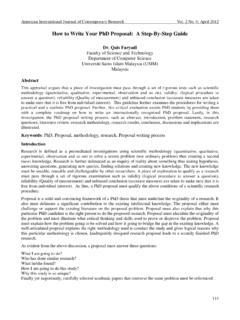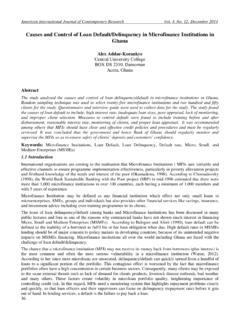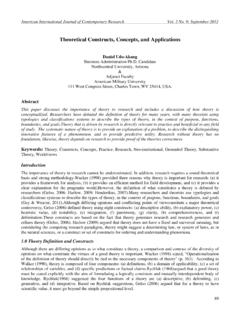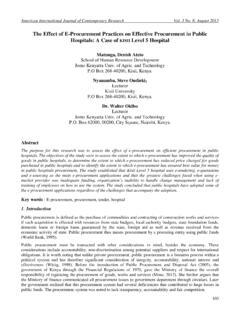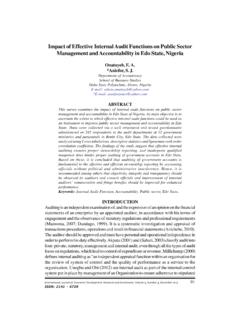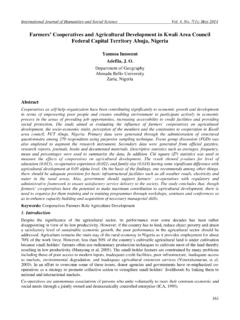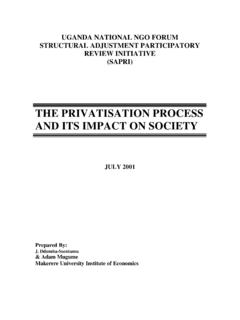Transcription of An Evaluation of the Challenges and Prospects of Micro …
1 American International Journal of Contemporary Research Vol. 2 No. 4; April 2012. An Evaluation of the Challenges and Prospects of Micro and Small Scale Enterprises Development in Nigeria Osotimehin, (PhD). Department of Management and Accounting Obafemi Awolowo University Ile-Ife, Nigeria. Jegede, Charles. A (PhD). Department of Accounting and Finance Faculty of Management Sciences Lagos State University Ojo, Lagos, Nigeria. Akinlabi, Babatunde. H. Department of Business Administration and Management Technology Faculty of Management Sciences Lagos State University External System Lagos, Nigeria.
2 Olajide, Department of Business Administration and Management Lagos State University Ojo, Lagos, Nigeria. Abstract Micro and small scale enterprises have been accepted worldwide as instrument of economic growth and development. No wonder that government, particularly in the developing countries has made tremendous efforts and establish policies to enhance the capacity of Micro and small scale enterprises (MSEs). However, despite government institutional and policies support to enhancing the capacity of small and medium scale enterprises, small and medium scale enterprises has fallen short of expectations.
3 This, then, generated serious concern and skepticism on whether SMEs can bring about economic growth and national developments in Nigeria. SMEs are faced with significant Challenges that compromise their ability to function and to contribute optimally to the economy. This study examines the Challenges and Prospects of Micro and small scale enterprises development in Nigeria. Most business enterprises in Nigeria by classification are grouped under Micro and small scale enterprises, hence, the scope of study.
4 This study was conducted in Lagos State, South Western Nigeria with the use of questionnaire and interview to gather relevant data that was statistically analyzed. The phenomenal growth of small and medium enterprise in Nigeria is mainly due to the people's quest to be self employed and not because it is easy to establish or manage. Financial constraints and Lack of management skill hamper the efficient performance of Micro and small scale enterprises in Nigeria. In view of this, we recommend that government and other non-governmental organization should regularly organize seminars for potential and actual small and medium enterprise operators on how to plan, organize, direct and control their businesses, and that Micro , small and medium enterprises operators' should device effective marketing strategies and good management customers relations at all times.
5 Keywords: MSE, Problems, Prospect, Development, Lagos, South-Western Nigeria. 1. Introduction Perhaps, no other development strategy has enjoyed as much prominence in Nigeria's development plans as the Small and Medium Scale Enterprises (SMEs) development strategy. 174. Centre for Promoting Ideas, USA In recent years, particularly since the adoption of the economic reform programme in Nigeria in 1986, there has been a decisive switch of emphasis from the grandiose, capital intensive, large scale industrial project based on the philosophy of import substitution to Micro and small scale enterprises with immense potentials for developing domestic linkages for rapid, sustainable industrial development.
6 Apart from their potential for ensuring a self reliant industrialization, in terms of ability to rely largely on local raw materials, small scale enterprises are also in a better position to boost employ raw materials, small and medium enterprise, are also in a better position to boost employment, guarantee a more even distribution of industrial development in the country, including the rural areas, and facilitate the growth of non-oil exports. According to the National Council on Industry (1991) cited in Olajide, Ogundele, Adeoye and Akinlabi (2008), Micro /cottage industry is an industry whose total project cost excluding cost of land but including working capital is not more than N500, 000:00 ( US$50,000); while small scale industry is an industry whose total project cost excluding cost of land and including working capital does not exceed N5m ( US$500,000).
7 These definitions were further reviewed by the council in 1996, that cottage/ Micro industry is an industry whose total cost, including working capital but excluding cost of land, is not more than N1 million and a labour size of not more than 10 workers, while small scale industry is an industry whose total cost, including working capital but excluding cost of land, is over N1 million but mot more than N40 million and a labour size of between 11 and 35. workers. Small scale business started gaining prominence in Nigeria in the early 1970s when many personal enterprises started springing up.
8 Before this time, agricultural dominate the economy. There were a lot of agricultural small holding before and during emergency of oil boom. Over 75 percent of agricultural holding were managed by the small farmers which comprise mainly family business Government agricultural holdings were not more than 10. percent. Micro and small scale businesses are catalyst in the socio economic development of any country. They are a veritable vehicle for the achievement of national macroeconomic objective in term of employment generation at low investment cost and enhancement of apprenticeship training.
9 In Kenya, for instance, Kombo, Justus, Murumba and Makworo (2011), submitted that Micro and small scale entrepreneurs who include agriculture and rural businesses have contributed greatly to the growth of Kenyan economy . The sector contributes to the national objective of creating employment opportunities, training entrepreneurs, generating income and providing a source of livelihoods for the majority of low income households in the country accounting for 12-14% of GDP. (Republic of Kenya, 1982, 1989, 1992, 1994).
10 The catalytic roles of Micro and cottage businesses have been displayed in many countries of the world such as Malaysia, Japan, South Korea, Zambia, and India among other countries. They contribute substantially to the Gross Domestic production (GDP), export earnings and employment opportunities of these countries. Micro and small scale enterprises (MSEs) have been widely acknowledged as the springboard for sustainable economic development. Apart from the fact that it contributes to the increase in per capital income and output, it also creates employment opportunities, encourage the development of indigenous entrepreneurship, enhance regional economic balance through industrial dispersal and generally promote effective resource utilization that are considered to be critical in the area of engineering economic development (Tolentino, 1996; Oboh, 2004; Odeh, 2005).

